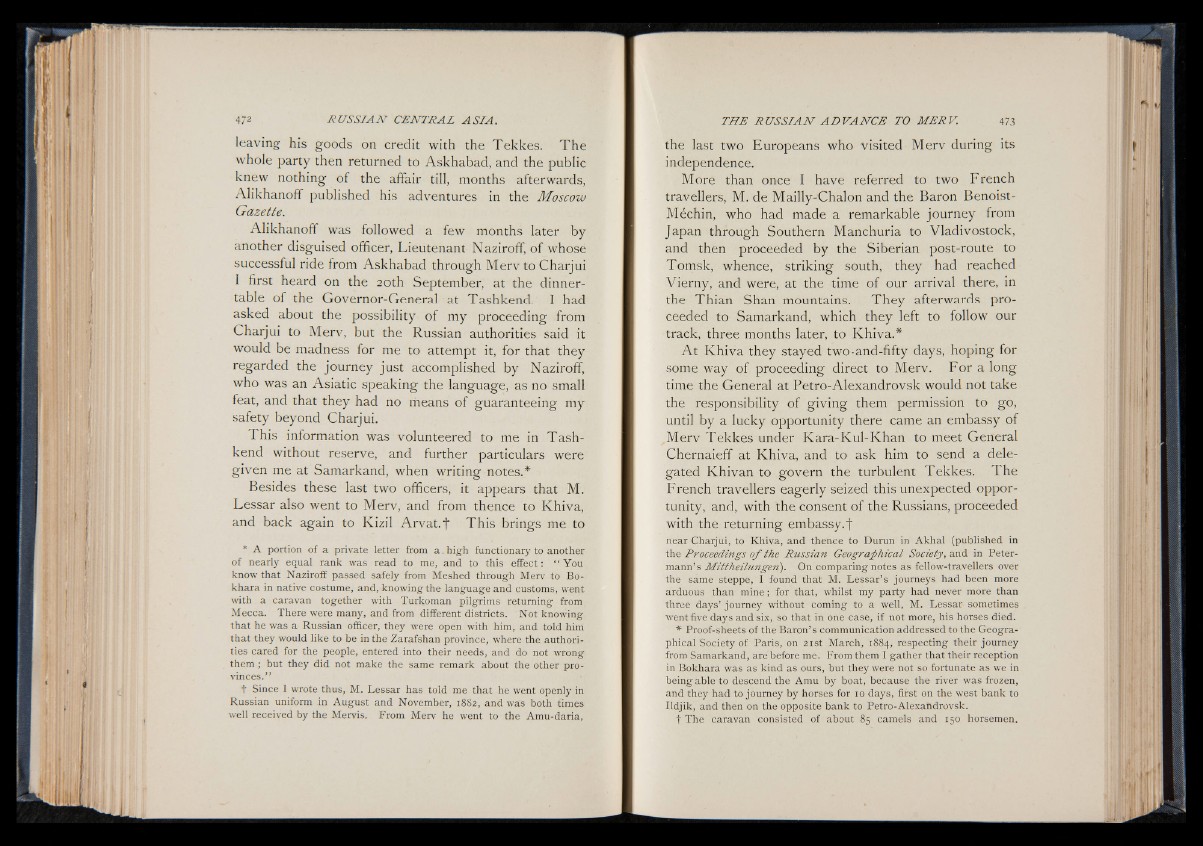
leaving his goods on credit with the Tekkes. T he
whole party then returned to Askhabad, and the public
knew nothing of the affair till, months afterwards,
Alikhanoff published his adventures in the Moscow
Gazette.
Alikhanoff was followed a few months later by
another disguised officer, Lieutenant Naziroff, of whose
successful ride from Askhabad through Merv to Charjui
I first heard on the 20th September, at the dinner-
table of the Governor-General at Tashkend. I had
asked about the possibility of my proceeding from
Charjui to Merv, but the Russian authorities said it
would be madness for me to attempt it, for that they
regarded the journey just accomplished by Naziroff,
who was an Asiatic speaking the language, as no small
feat, and that they had no means of guaranteeing my
safety beyond Charjui.
This information was volunteered to me in Tash-
kend without reserve, and further particulars were
given me at Samarkand, when writing notes.*
Besides these last two officers, it appears that M.
Lessar also went to Merv, and from thence to Khiva,
and back again to Kizil A rv a t.f This brings me to
* A portion of a private letter from a . high functionary to another
of nearly equal rank was read to me, and to this effect: “ You
know that Naziroff passed safely from Meshed through Merv to Bokhara
in native costume, and, knowing the language and customs, went
with a caravan together with Turkoman pilgrims returning from
Mecca. There were many, and from different districts. Not knowing
that he was a Russian officer, they were open with him, and told him
that they would like to be in the Zarafshan province, where the authorities
cared for the people, entered into their needs, and do not wrong
them ; but they did not make the same remark about the other provinces.”
t Since 1 wrote thus, M. Lessar has told me that he went openly in
Russian uniform in August and November, 1882, and was both times
well received by the Mervis. From Merv he went to the Amu-daria,
the last two Europeans who visited Merv during its
independence.
More than once I have referred to two French
travellers, M. de Mailly-Chalon and the Baron Benoist-
Mechin, who had made a remarkable journey from
Japan through Southern Manchuria to Vladivostock,
and then proceeded by the Siberian post-route to
Tomsk, whence, striking south, they had reached
Vierny, and were, at the time of our arrival there, in
the Thian Shan mountains. They afterwards proceeded
to Samarkand, which they left to follow our
track, three months later, to Khiva.*
A t Khiva they stayed two-and-fifty days, hoping for
some way of proceeding direct to Merv. For a long
time the General at Petro-Alexandrovsk would not take
the responsibility of giving them permission to go,
until by a lucky opportunity there came an embassy of
Merv Tekkes under Kara-Kul-Khan to meet General
Chernaieff at Khiva, and to ask him to send a delegated
Khivan to govern the turbulent Tekkes. The
French travellers eagerly seized this unexpected opportunity,
and, with the consent of the Russians, proceeded
with the returning embassy, f
near Charjui, to Khiva, and thence to Durun in Akhal (published in
the Proceedings o f the Russian Geographical Society, and in Peter-
mann’ s Mittheilungen). On comparing notes as fellow-travellers over
the same steppe, I found that M. Lessar’s journeys had been more
arduous than mine; for that, whilst my party had never more than
three days’ journey without coming to a well, M. Lessar sometimes
went five days and six, so that in one case, if not more, his horses died.
* Proof-sheets of the Baron’s communication addressed to the Geographical
Society of Paris, on 21st March, 1884, respecting their journey
from Samarkand, are before me. From them I gather that their reception
in Bokhara was as kind as ours, but they were not so fortunate as we in
being able to descend the Amu by boat, because the river was frozen,
and they had to journey by horses for 10 days, first on the west bank to
Ildjik, and then on the opposite bank to Petro-Alexafidrovsk.
t The caravan consisted of about 85 camels and 150 horsemen.